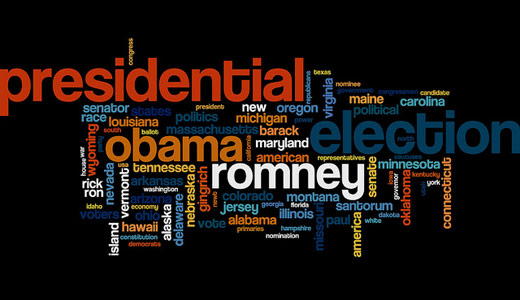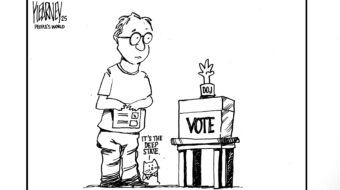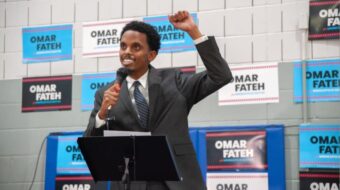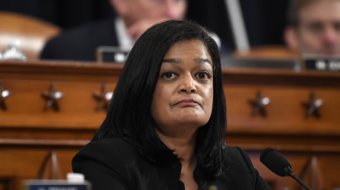
As anger grows against Mitt Romney’s arrogance and disdain for the “47%” of working class Americans he considers freeloaders, the importance of this election is hammered home. Will the choice be in favor of the interests of the 1% at the peril of everyone else? Or will our country come together and represent the needs of the majority?
This election is not just about who wins. It is about building a strong, multi-racial labor and people’s movement in our country that continues on after election day so that inequalities can be more fully addressed.
The contrast between the Republican and Democratic conventions made the choice abundantly clear.
The Republican convention was a highly militaristic, union bashing, racist and bigoted affair. The delegates were in no way reflective of our nation. Into the platform went a plank that prohibits women from abortion even in the case of rape. The goal to destroy unions was cheered. Plans to repeal the Affordable Care Act and privatize Medicare and Social Security were at the top of the agenda.
Mitt Romney even declared that President Obama lacks the one qualification for president — running a large corporation. The selection of Paul Ryan as vice presidential candidate put a spotlight on the Ryan Republican budget whose draconian cuts to human needs and support for increasing the military budget and tax breaks for the rich are opposed by the majority in our country.
The Republican two pronged strategy is to unleash enormous amounts of money to fill the airwaves with lies and slanders against President Obama and all Democratic candidates for U.S. Senate and House, while attempting to keep voters away from the polls with undemocratic voter suppression laws and misinformation about voting rights.
In contrast, the Democratic convention served as the venue for a coming together of the broad all-people’s front to defeat the right wing. The movement is at a higher level than in 2008. In Charlotte we witnessed a deeper understanding of the right wing corporate danger, and a growing realization that the system is structured in favor of the 1%. Also in the mix are elements of business, former Republicans and independents necessary to achieve a change in the balance of forces at this time.
The thrust of the entire convention was to expand the voting electorate. Reports on successful legal challenges to voter suppression laws in Texas, Florida and Ohio gave confidence that more of the laws will be overturned as a result of continuing challenges and grass roots organizing.
The convention included the largest ever numbers of African American, Hispanic, Asian Pacific Islander, Native American, women and youth delegates including large numbers of union members. This is reflective of the rising diverse and progressive electorate in our country, the majority of whom support Obama in large numbers. Recent polls show that African Americans support Obama by 94% to 0% for Romney and that Latinos support Obama by 72% to 24% for Romney.
The delegates were also reflective of the unprecedented grass roots organizing already underway in battleground states. They represented the hundreds of neighborhood teams across Ohio that have been going door to door all summer. They included steelworkers from Pittsburgh who have distributed 100,000 plant gate fliers exposing how Bain Capital was responsible for the loss of their unionized mills.
These grass roots delegates came in opposition to the tea party agenda and in response to the accomplishments over the last four years that made their lives better. They came in appreciation of the fact that any accomplishments achieved were in spite of the Republican leadership’s stated goal to make Obama fail, and the extreme racism against him since taking office.
They told their stories of how their lives were improved by the Lily Ledbetter Act for pay equity, the restoration of 4.3 million jobs including in the auto industry and through the stimulus bill for public works, the Affordable Care Act, the new G.I. Bill, the ending of Don’t Ask Don’t Tell, the endorsement of marriage equality, and an executive order deferring deportation of immigrant students. Also, the appointment of two women, including the first Latina, to the US Supreme Court and Hilda Solis as Secretary of Labor.
While the economic crisis is not resolved, it is significant that a Gallup poll released after the convention showed that 48 percent of people believe their standard of living is getting better, compared to 35 percent when Obama took office.
Delegates who are union members distributed fliers in support of the right to organize. As Richard Trumka said, North Carolina, with a union density of only 3%, was the perfect place to raise up the power of unions to achieve decent wages and benefits and a strong economy.
History was made by the inclusive character of convention floor speakers including the large number of women, and the large number of leading Latino speakers including a student without documents. The lies of the Republican convention holding Obama responsible for the nation’s deficit were taken on point by point, most notably by Bill Clinton’s arithmetic lesson.
The convention was a turning point in public support for President Obama, including an increase in support among men — cutting into Mitt Romney’s main strategy to win. Over 8,000 campaign events were held across the country on the weekend after the convention.
The contrast and extremism have caused some on the political left who were sitting it out to rethink. In a letter to peace activists, Tom Hayden challenged white liberal-left voters who only criticize Obama to reconsider their position and the breach it creates from the near unanimous support the President enjoys in the African American community.
Voter turnout is what will determine the outcome. This was the message in Michelle Obama’s call to action at caucus meetings. She pointed out that in 2008 Obama won North Carolina by the equivalent of five votes per precinct, saying, “If everyone finds five relatives or neighbors who don’t get it and convinces them to come out and vote, we win.”
The close polls for president and U. S. House and Senate races across the country show that this election is far from over. At least $75 million in Republican attack ads are yet to be launched, many in election districts with neck-in-neck campaigns. And, the volatile situation in the Middle East is an unknown factor.
The chance to win a Congress that will work with an Obama White House instead of blocking every proposal is vital to the ability of the broad people’s movement to accomplish new gains going forward. A Reuters/Ipsos poll shows Democrats with a 49% to 43% lead in congressional races. With a concerted and unified push to pull out the vote, the possibility is there to change the balance in Congress.
In the next few weeks there is something that everyone can do to reach out to family, friends, co-workers and neighbors, join in with labor walks and phone banks and spread the word about what is at stake for the 99%.
This gigantic battle is about our lives, our stories. It is about building the all peoples front standing up against the ruthless greed, racism, hate and environmental degradation of corporate America. The conditions are not present in this election to win a people before profits agenda. But the results of this election will determine the conditions under which working people can organize and rise up to challenge corporate greed and expand equality and democratic rights.
Photo: Vectorportal // CC 2.0










